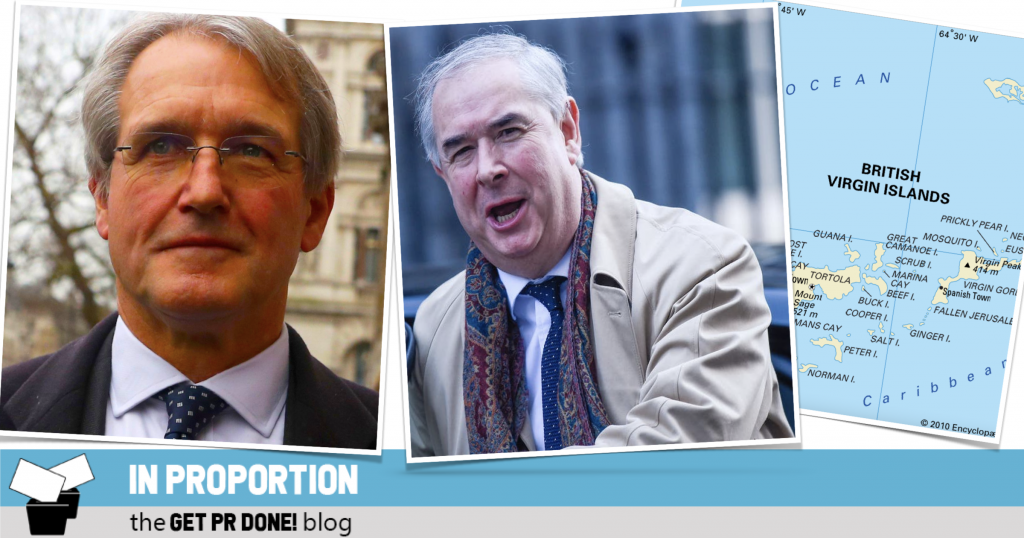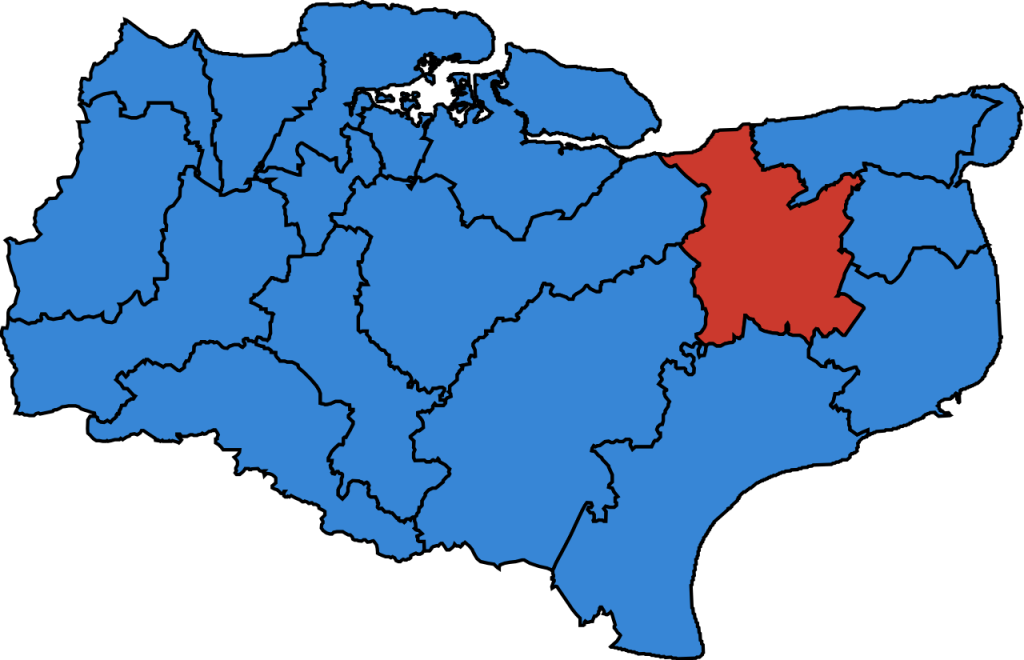
It is such a well-practiced line. And it sounds so reasonable and democratic.
Deputy PM Dominic Rabb was asked on Tuesday (9th Nov.) what he and the government thought of Devon MP and former Attorney General Geoffrey Cox earning over £1 million in legal fees (in addition to his MP salary of £82,000) in the past year and living (and voting remotely as an MP) in the British Virgin Islands for weeks on end. (To digress: it is worth noting that one of the cases being prosecuted by the UK government involves a rip-off tax haven in the BVI and a BVI prime minister is in the dock. No surprise why Cox is the lawyer defending; if Cox was still AG, he would be on the other side of this case.)
Raab’s reply to Cox’s rather extraordinary so-called “second income” was this:
“Ultimately, voters will decide on their MP and whether they’re spending enough time doing the job for them as their constituents.”
In Raab’s play-school approach to politics, voters are the all-powerful king makers in the system. If an MP screws up —- gets his hand caught in the till, engages in corrupt lobbying, or earns an embarrassingly high amount of money from a second job (or more) to “supplement” her or his MP salary —-we are told: “Just wait. It is the ballot box at the next election that will decide.”
If only it was that simple and straightforward. But it isn’t.
Since “sleazegate” kicked off a week ago — when the Tories tried to change the rules AFTER North Shropshire MP Owen Paterson had been found guilty of illegal corporate lobbying and paid hundreds of thousands of pounds in moonlighting fees (for one explanation see: https://www.bbc.co.uk/news/uk-politics-59184786) —- no one has even mentioned how the current electoral system has facilitated Tory brazenness in this scandal and how it will keep on doing so —- unless it is changed.
This blog aims to make a few points to rectify that omission.
THE TORIES HAVE MINORITY SUPPORT
1) We start first with the results of the 2019 general election still held under the archaic first-past-the-post (FPTP) voting system that was created in the 1800s.
In that election, the Tories got only 43% of the overall vote. That was only 1.2% above its vote in 2017 but translated into 56% of the total seats and an 80-seat majority.
In our voting system, votes won do not match seats won and the unfairness of the wacky maths of FPTP is obvious. That unfairness leads directly to the arrogance and entitlement shown by many in the current cabinet; Priti Patel is a good example.
It was that very same arrogance and entitlement which drove Johnson and some of Paterson’s friends in the first 24 hours of “sleazegate” when they tried to steamroller changes to the regulatory regime governing MPs’ lobbying activities.
Even some Tory MPs understood early on what was happening. “Owen Paterson was from a certain group of MPs from a certain period of time who had a sense of entitlement and large majorities who thought they could browbeat parliament into doing what they wanted,” said a Tory backbencher who voted against the government on 5th Nov.
“Entitlement” is precisely the right word.
THAT PROVERBIAL ‘DONKEY WITH A ROSETTE’.
2) “Large majorities” under FPTP create numerous safe seats, both Tory and Labour. They are the parliamentary constituencies that could be won by a donkey if it was wearing the right colour of rosette. (All right; I exaggerate…but only slightly.)
The Electoral Reform Society reports that a total of 10% of House of Commons seats haven’t changed hands since the end of World War One and a staggering total of 192 seats (30 %!) have not switched since the end of World War Two. In total, there are almost 200 safe seats.
Safe seats are a symptom of system break down. What’s the point of voting if the results are known in advance, if elections become coronations, and if seats are passed on within families and parties like personal treasure?
“Sleazegate” has understandably made many people very angry. Why not direct that anger at the blatantly rigged FPTP voting system and work to change it?
NORTH SHROPSHIRE IS A SUPER-SAFE SEAT
3) Dominic Rabb says voters have the power to sort out allegedly misbehaving or incompetent MPs at the ballot box. I would NOT use Paterson’s North Shropshire seat as an example to prove his case.
When we look back to 1832 – that’s right, 189 years ago – we find that most voters in North Shropshire have had a Tory MP for every year BUT TWO. The non-Tory years were 1906-08 when there was a Liberal MP.
And that’s not even a record. Down the road from Cox’s seat, East Devon (and its precursor) has never had any MP other than a Conservative since the constituency was created in 1835.
Is this an example of what Boris Johnson calls “global Britain” in action?
Has a North Shropshire and East Devon MP never needed replacing in 190 years (that is, besides Paterson in a 16th December “forced” by-election)?
TORY VOTERS ARE FAR OVER-REPRESENTED
4) You do not need to be an elections expert like John Curtice to recognise that there are sizeable pockets of Tory (and Labour) voters across the UK. And any serious electoral reformer agrees that the votes of Tory supporters need to be counted equally just like the votes of all other voters.
The key phase here is “just like the votes of all other voters.” Under FPTP they are not. Instead what FPTP does is to create 650 “winner takes all” contests in a general election and the millions of non-winner ballots are simply ignored.
To see how FPTP works, let’s look at the results from the 2019 general election for four English counties:
a) Devon (12 seats in total): https://en.wikipedia.org/wiki/List_of_Parliamentary_constituencies_in_Devon
b) Kent (17 seats) https://en.wikipedia.org/wiki/List_of_Parliamentary_constituencies_in_Kent
c) Shropshire (5 seats): https://en.wikipedia.org/wiki/Parliamentary_constituencies_in_Shropshire
d) Staffordshire (12 seats): https://en.wikipedia.org/wiki/List_of_Parliamentary_constituencies_in_Staffordshire
Here are the results:
| County | Total Seats | Tory Votes | Tory Seats | Other Votes | Other Seats |
| Devon | 12 | 54% | 10 | 46% | 2 |
| Kent | 17 | 60% | 16 | 40% | 1 |
| Shropshire | 5 | 60% | 5 | 40% | 0 |
| Staffordshire | 12 | 62% | 12 | 38% | 0 |
To take one example of “other voters”: In Staffordshire, Labour attracted 154,301 voters or 28.2% of the total vote. That resulted in zero MPs.
When you repeat this pattern across many counties, especially in England, again you don’t have to be John Curtice to work out how 43% of the total votes results in 56% of the total seats in the Commons. In the 2005 general election, Tony Blair got a sizeable majority of seats on a mere 35% of the overall vote.
PR IS A FAR FAIRER VOTING SYSTEM
The aim of this blog is not to sketch out the details of how a fairer voting system, namely proportional representation (PR), would operate. In any event, there are various PR systems and some operate quite differently one from another.
PR systems are fairer because all votes are counted; seats are awarded in a legislature or a parliament in proportion to the votes received. For example, if a party receives 15% of the total votes, it would expect to receive about 15% of the total seats under PR. Under FPTP, by contrast, a party might receive 11.7% of the overall vote (as the Liberal Democrats did in the 2019 general election), but only win 1.7% of the seats in the House of Commons. As well, tactical voting would be an obsolete concept under PR.
It is even easier to understand how PR might work by returning to our county-wide votes won and seats awarded statistics above. Under PR, Kent might become a multi-member constituency with a total of 17 seats. (This is how the PR system operates in Finland.) If the Tories got 60.1% of the total votes, they would be awarded about 60% of the total seats and NOT 16 of the 17 seats as at present.
The remaining 40% of seats in Kent would be awarded to other parties on a proportionate basis. In the 2019 election, Labour got 25% of the total votes. Thus under PR, Labour would be awarded about 4 of Kent’s 17 seats and not a single seat, Canterbury, as at present.

++++++++++
At the start I quoted from Dominic Rabb on who would decide whether the conduct of Geoffrey Cox was appropriate. He said:
“Ultimately, voters will decide on their MP and whether they’re spending enough time doing the job for them as their constituents.”
Bringing in PR would not be a silver bullet that would magically clean up our political life. But under PR, there is far greater chance of his words ringing true than under our current rigged FPTP system.
Under FPTP, Rabb’s words are mostly a myth and echo the type of misleading phrases often found in Daily Mail editorials.
++++++++++
IN PROPORTION is the blog of the cross-party/no-party campaign group GET PR DONE! We are campaigning to bring in a much fairer proportional representation voting system. Unless otherwise stated, each blog reflects the personal opinion of its author.
We welcome contributed blogs. Send a brief outline (maximum 75 words) to getprdone@gmail.com
Join the very active Facebook group of GET PR DONE! (+2,600 members as of 8 November) at: https://www.facebook.com/groups/625143391578665/